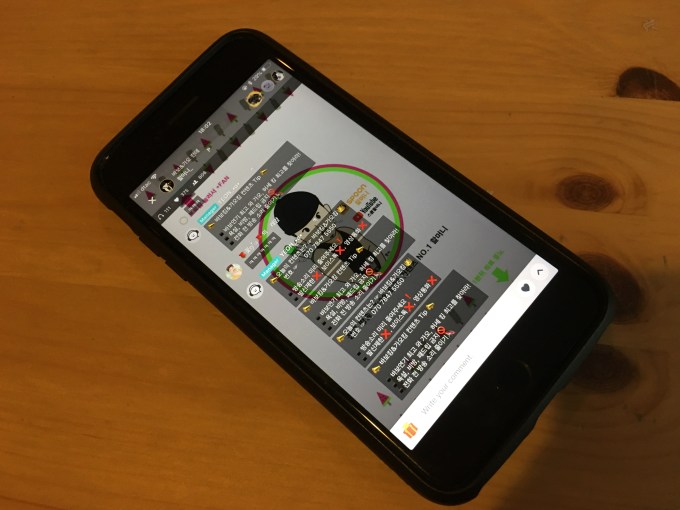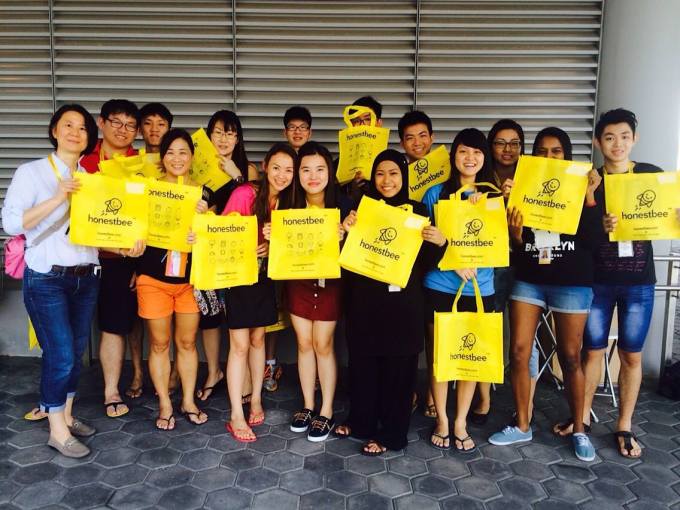Singapore
Auto Added by WPeMatico
Auto Added by WPeMatico
After a limited rollout, Go-Jek said today that it will extend its ride-hailing service to all of Singapore tomorrow while continuing its beta phase. The Indonesian-based company began offering rides in Singapore at the end of November, but only for passengers riding to and from certain areas. It introduced dynamic pricing there, which increases prices during peak times, a few days ago.
“We continue to welcome feedback from driver-partners and riders during this enhanced beta phase, as we work to fine-tune the app and create the best experience for our users,” the company said in a statement.
After Uber exited from Southeast Asia earlier this year by selling its local business to Grab, Go-Jek became Grab’s main rival. Uber still maintains a presence in the region, however, thanks to its 27.5 percent stake in Grab.
There is currently a waiting list for Go-Jek in Singapore, with customers of DBS/POSB being given priority.
When asked about how long new users need to wait, a Go-Jek spokesperson said in a statement that the time depends on supply and demand. “The response from the driver community since we opened pre-registration has been overwhelming with tens of thousands of drivers signing up via the pre-registration portal. While we can’t disclose figure at this moment, we are confident we can meet consumer expectations during the beta service period.”
Powered by WPeMatico
One of the early backers of Musical.ly, the short video app that was acquired for $1 billion, is making a major bet that internet radio is one of the next big trends in media.
Goodwater Capital, one of a number of backers that won big when ByteDance acquired Musical.ly last year, has joined forces with Korean duo Softbank Ventures and KB Investment to invest $17 million into Korea’s Spoon Radio. The deal is a Series B for parent company Mykoon, which operates Spoon Radio and previously developed an unsuccessful smartphone battery sharing service.
That’s much like Musical.ly, which famously pivoted to a karaoke app after failing to build an education service.
“We decided to create a service, now known as Spoon Radio, that was inspired by what gave us hope when [previous venture] ‘Plugger’ failed to take off. We wanted to create a service that allowed people to truly connect and share their thoughts with others on everyday, real-life issues like the ups and downs of personal relationships, money, and work.
“Unlike Facebook and Instagram where people pretend to have perfect lives, we wanted to create an accessible space for people to find and interact with influencers that they could relate with on a real and personal level through an audio and pseudo-anonymous format,” Mykoon CEO Neil Choi told TechCrunch via email.
Choi started the company in 2013 with fellow co-founders Choi Hyuk jun and Hee-jae Lee, and today Spoon Radio operates much like an internet radio station.
Users can tune in to talk show or music DJs, and leave comments and make requests in real-time. The service also allows users to broadcast themselves and, like live-streaming, broadcasters — or DJs, as they are called — can monetize by receiving stickers and other virtual gifts from their audience.
Spoon Radio claims 2.5 million downloads and “tens of millions” of audio broadcasts uploaded each day. Most of that userbase is in Korea, but the company said it is seeing growth in markets like Japan, Indonesia and Vietnam. In response to that growth — which Choi said is over 1,000 percent year-on-year — this funding will be used to invest in expanding the service in Southeast Asia, the rest of Asia and beyond.

Audio social media isn’t a new concept.
Singapore’s Bubble Motion raised close to $40 million from investors but it was sold in an underwhelming and undisclosed deal in 2014. Reportedly that was after the firm had failed to find a buyer and been ready to liquidate its assets. Altruist, the India-based mobile services company that bought Bubble Motion has done little to the service. Most changes have been bug fixes and the iOS app, for example, has not been updated for nearly a year.
Things have changed in the last four years, with smartphone growth surging across Asia and worldwide. That could mean different fortunes but there are also differences between the two in terms of strategy.
Bubbly was run like a social network — a ‘Twitter for voice’ — whereas Spoon Radio is focused on a consumption-based model that, as the name suggests, mirrors traditional radio.
“This is mobile consumer internet at its best,” Eric Kim, one of Goodwater Capital’s two founding partners, told TechCrunch in an interview. “Spoon Radio is taking an offline experience that exists in classic radio and making it even better.”
Kim admitted that when he first used the service he didn’t see the appeal — he claimed the same was true for Musical.ly — but he said he changed his tune after talking to listeners and using Spoon Radio. He said it reminded him of being a kid growing up in the U.S. and listening to radio shows avidly.
“It’s a really interesting phenomenon taking off in Asia because of smartphone growth and people being keen for content, but not always able to get video content. It was a net new behavior that we’d never seen before… Musical.ly was in the same bracket as net new content for the new generation, we’ve been paying attention to this category broadly,” Kim — whose firm’s other Korean investments include chat app giant Kakao and fintech startup Toss — explained.
Powered by WPeMatico
Gaming hardware maker Razer, which went public in a big IPO in Hong Kong last year, is doubling down on payments after it announced a deal to acquire MOL, a company that offers online and offline payments in Southeast Asia.
Razer made an initial $20 million investment in MOL last June to supercharge its zGold virtual credit program for gamers by allowing them to buy using MOL’s online service or its offline, over-the-counter network of retailers that includes 7-Eleven. Now Razer aims to gobble up MOL in full by acquiring the remaining 65 percent, which will allow it to grow its alternative revenue streams by pushing fully into payment services by merging MOL’s virtual payment platform with zGold.
It’s worth noting that the deal is an intention to buy MOL. It’ll be subject to review from shareholders, but Razer said it has already secured support from major shareholders. The transaction gives MOL, which delisted from the Nasdaq in 2016 following a bumpy two-year spell, the same $100 million valuation it held for the initial Razer investment.
The acquisition will boost Razer’s recently announced online games store, which rivals services like Steam, but first and foremost it is focused on growing the firm’s share of online sales in Southeast Asia’s growing e-commerce and payment space. To that end, Razer recently launched a store on Lazada, the Alibaba-owned e-commerce service in Southeast Asia, something that Apple did earlier this year.
“We are already the No. 1 gaming brand in the U.S., Europe and China, but Southeast Asia is still nascent and a very small part of our business,” Razer CEO and co-founder Min-Liang Tan told TechCrunch in an interview. “We see this [deal with MOL] as stuff we can do immediately.”
Tan said that, in particular, working with MOL saw revenue grow “dramatically” while MOL itself surpassed $1.1 billion in GMV across its payment network last year.
“This is the perfect opportunity for us to not just be a minority shareholder, but to combine the business and continue scaling from here,” he added, reiterating that he believes the deal gives Razer the world’s largest virtual credit system for gamers based on user registrations. “That’s a huge opportunity for us.”
Away from its core business, the push will also help Razer in Singapore where it has applied to develop a unified e-payment system that would be used across the country, which is the Razer CEO home nation.
Tan said he has kept an ongoing dialogue with regulators, adding that he believes this deal “makes it clear that we don’t just have the scale, we also have the right technology.”
Beyond the Singapore opportunity, where Razer is a new entrant and thus considered an outsider for the license, Tan said the focus is on enabling cash-less payments right across Southeast Asia.
The blockchain has been widely touted as a building block that can help develop financial inclusion platforms in emerging markets, but for now Razer isn’t talking about whether it will hop on that wagon.
“We are excited about blockchain and the technology it brings, but we don’t have anything to comment on at this juncture,” Tan said.
The Razer chief was more vocal on the company’s wider goal, which he said is to develop “an entire ecosystem for our games partners.” The goal is to offset Razer’s impressive hardware sales business by constructing services that span game payments, game distribution and analytics on gamers and their behavior.
That optimism isn’t shared right now by investors in Hong Kong, however, which lured Razer as part of a push to attract more tech listings. Despite a surge when it when public in November, the stock traded at an all-time low of HK$2.44 today, down from its initial list price of HK$3.88.
Tan said he is focused on growing the business and its services regardless, but he did admit there’s a need for “the Hong Kong investment public to be more educated on tech companies.”
Powered by WPeMatico
There are two kinds of people in the world: those who hate building IKEA furniture and madmen. Now, thanks to IkeaBot, the madmen can be replaced.
IkeaBot is a project built at Control Robotics Intelligence (CRI) group at NTU in Singapore. The team began by teaching robots to insert pins and manipulate IKEA parts, then, slowly, they began to figure out how to pit the robots against the furniture. The results, if you’ve ever fought with someone trying to put together a Billy, are heartening.
From Spectrum:
The assembly process from CRI is not quite that autonomous; “although all the steps were automatically planned and controlled, their sequence was hard-coded through a considerable engineering effort.” The researchers mention that they can “envision such a sequence being automatically determined from the assembly manual, through natural-language interaction with a human supervisor or, ultimately, from an image of the chair,” although we feel like they should have a chat with Ross Knepper, whose IkeaBot seemed to do just fine without any of that stuff.
In other words the robots are semi-autonomous but never get frustrated and can use basic heuristics to figure out next steps. The robots can now essentially assemble chairs in about 20 minutes, a feat that I doubt many of us can emulate. You can watch the finished dance here, in all its robotic glory.
The best part? Even robots get frustrated and fling parts around:
I, for one, welcome our IKEA chair manufacturing robotic overlords.
Powered by WPeMatico
 Cars congesting roads is a problem in just about every major urban center around the world, but some areas are worst in this regard than others. Singapore is one of those, and it’s going to do something about it – the government there has announced that it will cut the annual growth rate of cars and motorcycles allowed on roads in the country from 0.25 percent to zero starting… Read More
Cars congesting roads is a problem in just about every major urban center around the world, but some areas are worst in this regard than others. Singapore is one of those, and it’s going to do something about it – the government there has announced that it will cut the annual growth rate of cars and motorcycles allowed on roads in the country from 0.25 percent to zero starting… Read More
Powered by WPeMatico
 Mobile phones have emerged as the dominant alternative payment method to cash for buying and selling goods and services in emerging markets. And with a service akin to alternative payment providers like M-Pesa and Pagatech in Africa and a slew of alternative payment platforms in Southeast Asia, Tapp’s technology is one that the region understands well. Read More
Mobile phones have emerged as the dominant alternative payment method to cash for buying and selling goods and services in emerging markets. And with a service akin to alternative payment providers like M-Pesa and Pagatech in Africa and a slew of alternative payment platforms in Southeast Asia, Tapp’s technology is one that the region understands well. Read More
Powered by WPeMatico
 Honestbee just raised $15 million for its on-demand grocery delivery service, but it has loftier aspirations. Head of marketing Shane Chiang says the Singapore-based company launched as a “social impact business” to give employment to people who can’t hold a regular job, such as stay-at-home parents, caregivers, and students. Honestbee’s part-time shoppers collect… Read More
Honestbee just raised $15 million for its on-demand grocery delivery service, but it has loftier aspirations. Head of marketing Shane Chiang says the Singapore-based company launched as a “social impact business” to give employment to people who can’t hold a regular job, such as stay-at-home parents, caregivers, and students. Honestbee’s part-time shoppers collect… Read More
Powered by WPeMatico
 As a seasoned self-published author with an excess of one book under my belt, I’ve been looking for new and interesting publishing tools for indie writers. Recently I found something called Publishizer, a crowdfunding system just for books. While I’m not entirely convinced it’s the way to go for new authors, it does seem like a compact and focused solution for getting your… Read More
As a seasoned self-published author with an excess of one book under my belt, I’ve been looking for new and interesting publishing tools for indie writers. Recently I found something called Publishizer, a crowdfunding system just for books. While I’m not entirely convinced it’s the way to go for new authors, it does seem like a compact and focused solution for getting your… Read More
Powered by WPeMatico
 Carousell, a mobile app marketplace that lets sellers upload items with a few taps on their smartphones, has raised $6 million in Series A funding led by Sequoia Capital. The Singaporean startup’s existing investors, Rakuten Ventures, Golden Gate Ventures, 500 Startups, and serial entrepreneur Darius Cheung, also returned for this round, which brings Carousell’s total raised so far… Read More
Carousell, a mobile app marketplace that lets sellers upload items with a few taps on their smartphones, has raised $6 million in Series A funding led by Sequoia Capital. The Singaporean startup’s existing investors, Rakuten Ventures, Golden Gate Ventures, 500 Startups, and serial entrepreneur Darius Cheung, also returned for this round, which brings Carousell’s total raised so far… Read More
Powered by WPeMatico